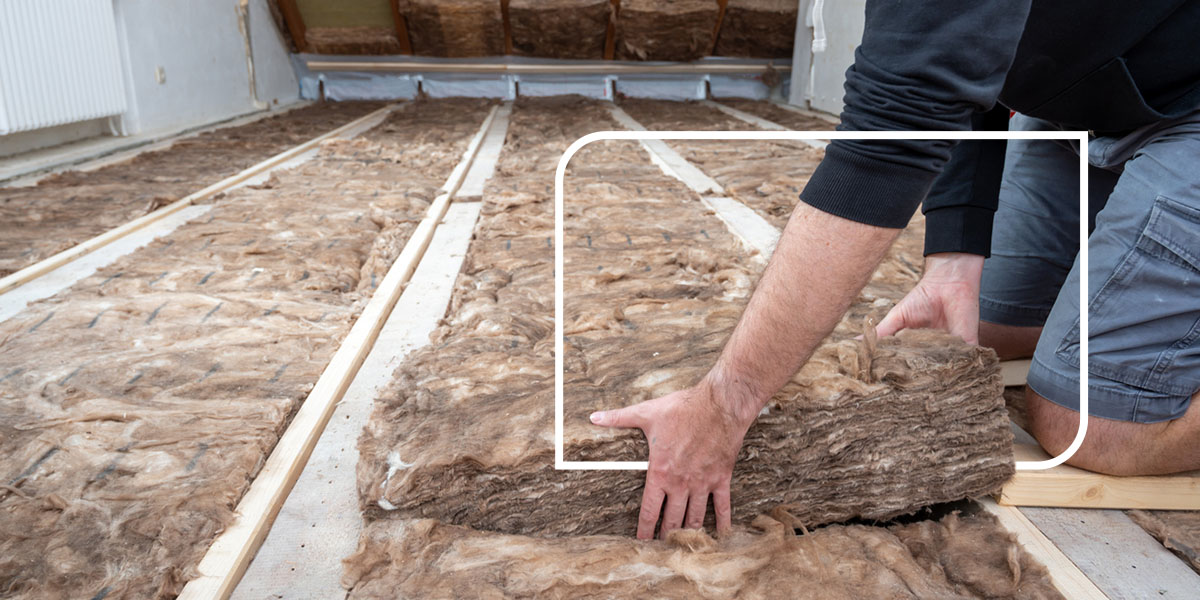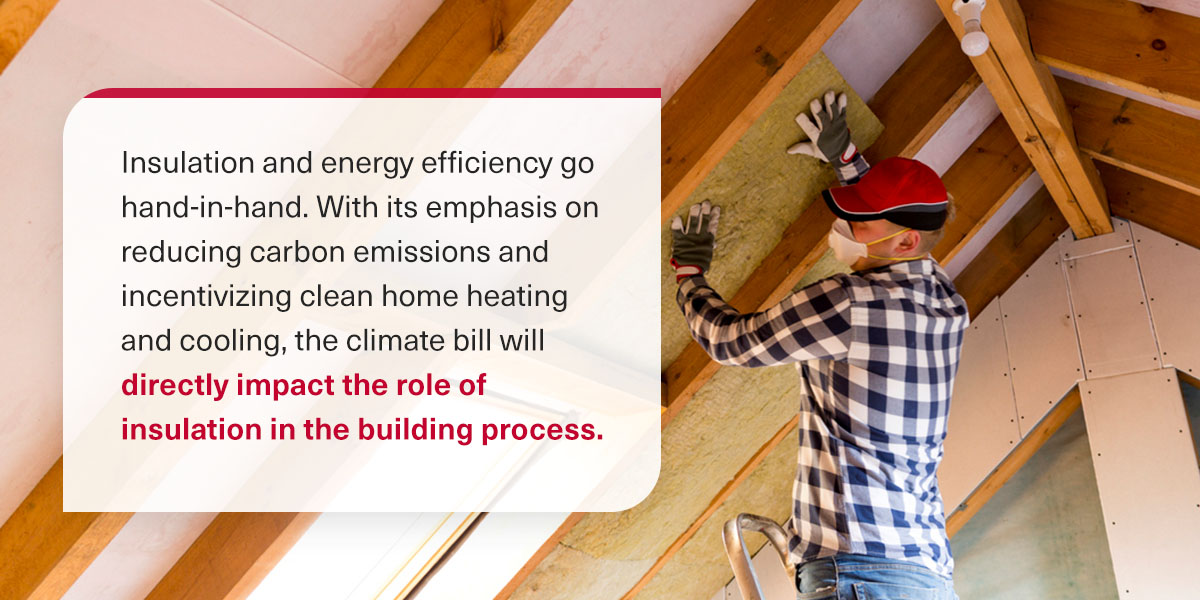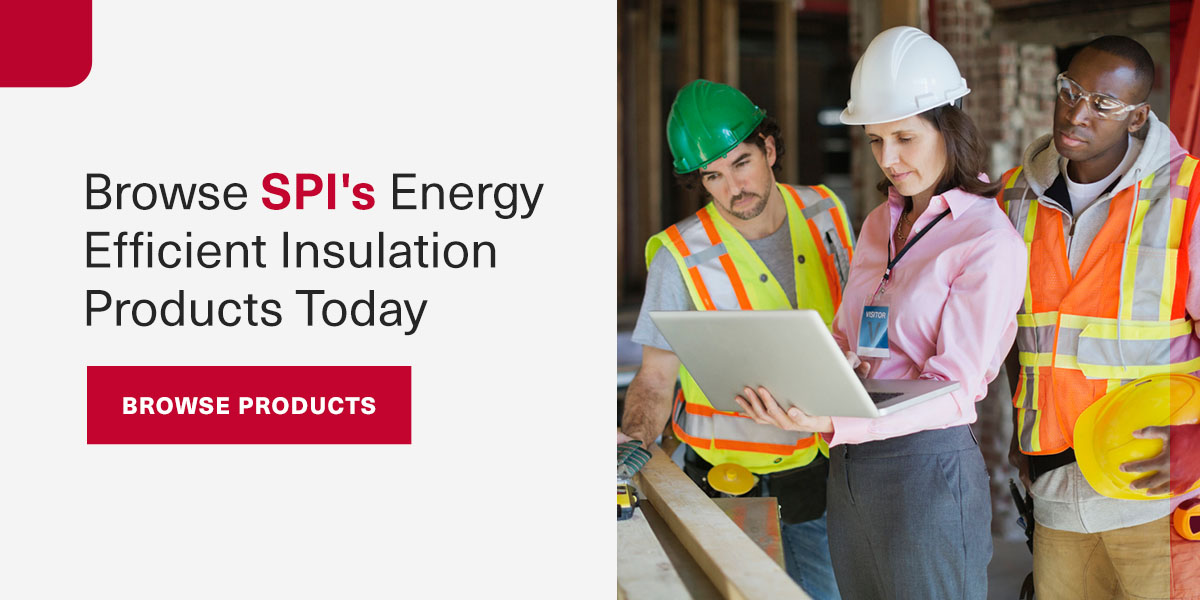How the Inflation Reduction Act Will Impact the Insulation Industry
Posted on Thursday Jul 20, 2023 at 07:04PM in Insulation

On August 16, 2022, the United States government passed the Inflation Reduction Act (IRA). The act, also known as the climate bill or the inflation relief bill, aims to help the country fight inflation and move toward cleaner energy consumption by providing $369 billion for energy efficiency and renewables. It comes with new tax credits, rebates, and community and environmental justice programs that incentivize Americans to make changes to help the nation tackle climate change. Those who take advantage of the credits and rebates associated with this act can save significantly on costs.
Learn more about how the Inflation Reduction Act will affect the insulation industry.
What Is the Inflation Reduction Act?
The Inflation Reduction Act of 2022 directs federal spending to do the following:
- Combat inflation by enacting deficit reduction.
- Allow Medicare to negotiate drug prices and limit out-of-pocket costs to $2,000.
- Reduce health insurance premiums for millions of people under the Affordable Care Act.
- Make large corporations and the ultra-wealthy pay proportionally.
- Stop new taxes on families making less than $400,000 and small businesses.
In addition to these goals, the act aims to invest more in domestic energy production with an emphasis on clean energy. It takes a whole-economy approach, providing wage and training requirements, investments in manufacturing, and incentives for innovation and deployment. The climate bill also intends to help American households save on energy expenses regarding the vehicles they drive and their home's heating, cooling, and ventilation systems. These resources are to be provided in addition to existing federal, state, city, and utility programs.
The act was signed into law in August 2022, but its tax benefits were not effective until January 1, 2023. Spending must occur in 2023 or later to qualify for the tax credits from the Inflation Reduction Act.
What Energy Conservation and Carbon Reduction Incentives Are Included?
The Inflation Reduction Act includes various financial incentives for American households and businesses. The following are among the most significant tax credits that will benefit those taking steps to lower energy consumption and its associated costs:
Used Clean Vehicles Credit
The climate bill includes a used clean vehicle credit that equals 30% of the electric or fuel cell vehicle's sale price, up to $4,000. This credit has a few stipulations, including:
- The taxpayer must purchase the vehicle with the intent to use it and not resell it.
- The taxpayer cannot be the car's original owner.
- The vehicle's sale price cannot exceed $25,000.
- The car must be at least 2 years old.
- The taxpayer must buy the vehicle from a qualified electric vehicle dealer.
This credit also has limitations depending on the taxpayer's modified adjusted gross income.
Energy-Efficient Home Improvement Credit
The Inflation Reduction Act also includes an energy-efficient home improvement credit. The U.S. government increased this credit from $500 to a maximum of $1,200 for 2023 .
The taxpayer can get up to 30% of qualified expenses relating to the following:
- Installation costs for energy-efficiency improvements
- Residential energy property costs
- Home energy audits
The government outlines credit eligibility limits and energy efficiency requirements for specific home improvement projects, such as replacing an entry door or switching to a heat pump.
Residential Energy Efficiency Property Credit
Another credit included in the climate bill is the residential energy efficiency property credit. Taxpayers can receive a credit for 30% of qualified energy-efficient expenses for their property.
The credit intends to incentivize the installation and use of alternative energy equipment, including:
- Solar water heaters
- Solar electric systems
- Fuel cell energy systems
- Geothermal heat pumps
- Small wind turbines
- Biomass fuel systems
To be eligible for this tax credit, taxpayers must have used the energy-saving units on the property after 2021.
45L Tax Credits for Zero Energy Ready Homes
The Inflation Reduction Act amended Section 45L of the Internal Revenue Code (IRC). The amendment now provides a tax credit for developers who constructed new homes or reconstructed existing homes to meet the requirements of the Department of Energy Zero Energy Ready Home or Energy Star home programs.
Builders can now receive $5,000 for eligible single-family and manufactured homes, and they can get $1,000 for dwelling units that qualify for the Energy Star Multifamily New Construction Program.
179D Commercial Buildings Energy-Efficiency Tax Deduction
The climate bill also updated Section 179D of the IRC. The government significantly increased deduction rates for 2023. Taxpayers can now claim up to $5 per square foot on qualifying properties.
A building can qualify for a deduction if its annual energy costs decrease by 25%. The stipulation was originally a 50% decrease. The amendment also extended eligibility to commercial buildings, especially tax-exempt and energy-efficient ones.

How Will the Inflation Reduction Act Impact the Insulation Industry?
Insulation and energy efficiency go hand-in-hand. With its emphasis on reducing carbon emissions and incentivizing clean home heating and cooling, the climate bill will directly impact the role of insulation in the building process.
Here are some of the main ways the insulation industry is affected by the Inflation Reduction Act:
Greater Demand
In 2021, the global market size for insulation was nearly $58 billion , and the industry continues to grow yearly as more people prioritize energy conservation.
According to the Environmental Protection Agency, proper insulation can save homeowners an average of 15% on their heating and cooling bills.
These savings are driving more builders and contractors to install insulation for energy conservation and reduction purposes in both residential and commercial buildings.
With the Inflation Reduction Act incentivizing energy efficiency, the demand for insulation products and installation will likely continue booming in the coming years.
Pushing for State Rebate Programs
The Inflation Reduction Act includes two major energy-efficiency rebate programs , the High-Efficiency Electric Home Rebate Program and HOME Rebates Program. Both help reduce the costs of insulation installation and products, and they benefit the industry as a whole. However, they require approval from the state for implementation.
To take advantage of the savings, those in the insulation industry must push their state energy offices to request funding from the federal government.
Builders and insulation experts should contact their state energy offices to ensure they are willing to participate in the rebate program and extend its benefits to local taxpayers.
Browse SPI's Energy Efficient Insulation Products Today
Businesses and homeowners looking to transition to greater energy efficiency will benefit from the Inflation Reduction Act's rollout. The tax credits and rebate programs will make switching to cleaner, domestic energy more affordable for Americans.
If you're looking for durable, high-quality insulation products to boost energy efficiency, turn to Specialty Products and Insulation. We have over 40 years of experience and a vast selection of products. Our knowledgeable team is here to help you find the right products for your unique applications.
Are you interested in learning more? Browse building insulation from Specialty Products and Insulation today!

